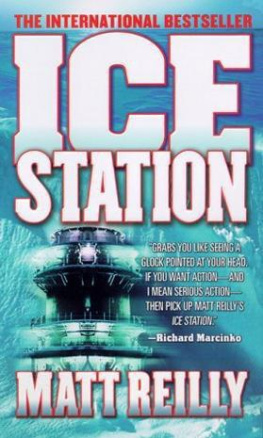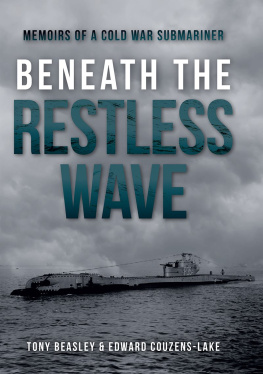ICE STATION
M ATT R EILLY
St. Martin's Paperbacks
FOR NATALIE
First published in Australia by Pan Macmillan Australia Pty Limited.
ICE STATION
Copyright 1999 by Matthew Reilly.
Excerpt from Temple copyright 2000 by Matt Reilly.
All rights reserved. No part of this book may be used or reproduced in any manner whatsoever without written permission except in the case of brief quotations embodied in critical articles or reviews. For information address St. Martin's Press, 175 Fifth Avenue, New York, N.Y. 10010.
Library of Congress Catalog Card Number: 99-23845
ISBN: 0-312-97123-0
Printed in the United States of America
St. Martin's Press hardcover edition / September 1999 St. Martin's Paperbacks edition / September 2000
10 9 8 7 6 5
ACKNOWLEDGMENTS
Special thanks to Natalie Freerthe most genuine and giving person I know. To Stephen Reilly, my brother and my good friend and my loyal supporter, even from thousands of miles away. To Mum for her comments on the text and to Dad for his woeful title suggestions and to both of them for their love and support. And, last, thanks to everyone at Pan and Thomas Dunne Books (in particular, my editors, Cate Paterson, Pete Wolverton, and Madonna Duffy, first, for "discovering" me and, second, for enduring all of my crazy ideas). To all of you, never underestimate the power of your encouragement.
SOUTHEASTERN ANTARCTICA
THE ANTARCTIC ICE SHELF
INTRODUCTION
From: Kendrick, Jonathan
The Cambridge Lectures: Antarctica
The Living Continent
(Lecture delivered at Trinity College,
17 March, 1995)
Imagine, if you can, a continent that for one-quarter of the year doubles in size. A continent in a constant state of motion, motion that is undetectable to the human eye, but that is devastating nonetheless.
Imagine if you were to look down from the heavens at this vast, snow-covered mass. You would see the signatures of motion: the sweeping waves of the glaciers, bending in curves around mountains, falling down slopes like cascading waterfalls captured on film.
This is the 'awesome inertia' that Eugene Linden spoke of. And if we, like Linden, imagine that we are looking at that picture through time-lapse photography , taken over thousands of years, then we will see that motion.
Thirty centimeters of movement every year doesn't look like much in real time, but in time-lapse glaciers become flowing rivers of ice, ice that moves with free-flowing grace and awesome, unstoppable power.
Awesome ? I hear you scoff. Thirty centimeters a year? What possible harm could that do ?
A lot of harm to your tax dollars, I would say. Did you know that the British government has had to replace Halley Station on four separate occasions? You see, like many other Antarctic research stations, Halley station is built underground, buried in the icebut a mere thirty centimeters of shift every year cracks its walls and drastically skews its ceilings.
The point here is that the walls of Halley Station are under a lot of pressure, a lot of pressure. All of that ice, moving outward from the pole, moving inexorably toward the sea, it wants to get to the seato see the world, you might say, as an iceberg and it isn't going to let something as insignificant as a research station get in its way!
But then again, comparatively speaking, Britain has come off rather well when it comes to dramatic ice movement.
Consider when, in 1986, the Filchner Ice Shelf calved an iceberg the size of Luxembourg into the Weddell Sea. Thirteen thousand square kilometers of ice broke free of the mainland ... taking with it the abandoned Argentine base station, Belgrano I, and the Soviet summer station, Druzhnaya. The Soviets, it seems, had planned to use Druzhnaya that summer. As it turned out, they spent the next three months searching for their missing base among the three massive icebergs that had formed out of the original ice movement! And they found it. Eventually.
The United States has been even less fortunate. All five of its 'Little America' research stations floated out to sea on icebergs in the sixties.
Ladies and gentlemen, the message to be taken from all of this is quite simple. What appears to be barren may not really be so. What appears to be a wasteland may not really be so. What appears to be lifeless may not really be so.
No . For when you look at Antarctica, do not be fooled . You are not looking at an ice-covered rock. You are looking at a living, breathing continent.
From: Goldridge, William
Watergate
(New York: Wylie, 1980)
CHAPTER 6: THE PENTAGON
... What the literature is oddly silent about, however, is the strong bond Richard Nixon forged with his military advisers, most notably an Air Force Colonel named Otto Niemeyer... [p- 80]
... After Watergate, however, no one is quite sure what happened to Niemeyer. He was Nixon's liaison to the Joint Chiefs of Staff, his insider. Having risen to the rank of full colonel by the time Nixon resigned, Niemeyer had enjoyed what few people could ever lay claim to: Richard Nixon's ear.
What is surprising, however, is that after Nixon's resignation in 1974, not much can be found in the statute books regarding Otto Niemeyer. He remained on the Joint Chiefs of Staff under Ford and Carter, a silent player, keeping much to himself, until 1979, when abruptly, his position became vacant.
No explanation was ever given by the Carter Administration for Niemeyer's removal. Niemeyer was unmarried; some suggested, homosexual. He lived at the military academy at Arlington, alone. He had few people who openly claimed to be his friends. He traveled frequently, often to 'destinations unknown,' and his work colleagues thought nothing of his absence from the Pentagon for a few days in December of 1979.
The problem was, Otto Niemeyer never returned ... [p. 86]
PROLOGUE
Wilkes Land, Antarctica 13 June
It had been three hours now since they'd lost radio contact with the two divers.
There had been nothing wrong with the descent, despite the fact that it was so deep. Price and Davis were the most experienced divers at the station, and they had talked casually over the intercom the whole way down.
After pausing halfway to repressurize, they had continued down to three thousand feet, where they had left the diving bell and begun their diagonal ascent into the narrow, ice-walled cavern.
Water temperature had been stable at 1.9 Celsius. As recently as two years previously, Antarctic diving had been restricted by the cold to extremely short-lived and, scientifically speaking, extremely unsatisfactory ten-minute excursions. However, with their new Navy-made thermal-electric suits, Antarctic divers could now expect to maintain comfortable body temperatures for at least three hours in the near-freezing waters of the continent.
The two divers had maintained steady conversation over the radio as they made their way up the steep underwater ice tunnel, describing the cracked, rough texture of the ice, commenting on its rich, almost angelic sky blue color.
And then, abruptly, their talking had stopped.
They had spotted the surface.
The two divers stared at the water's surface from below.
It was dark, the water calm. Unnaturally calm. Not a ripple broke its glassy, even plane. In the glare of their military-spec halogen flashlights, the ice walls around them glistened like crystal. They swam upward.
Suddenly they heard a noise.
The two divers stopped.
At first it was just a single haunting whistle, echoing through the clear, icy water. Whale song, they thought.
Possibility: killers. Recently a pod of killer whales had been seen lurking about the station. A couple of themtwo juvenile maleshad made a habit of coming up for air inside the pool at the base of Wilkes Ice Station.
Next page















